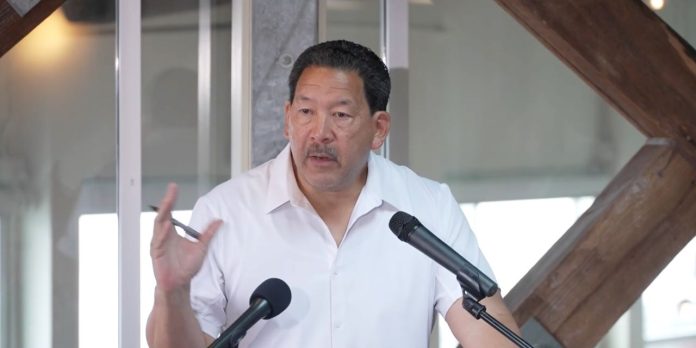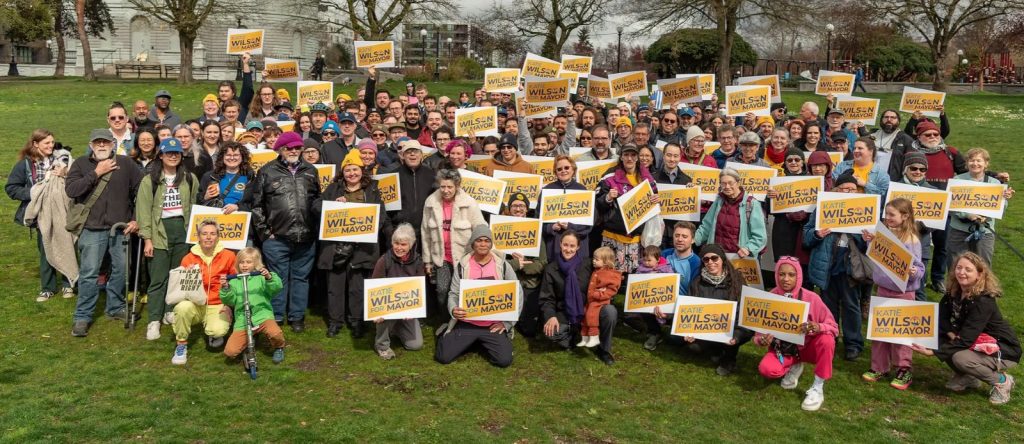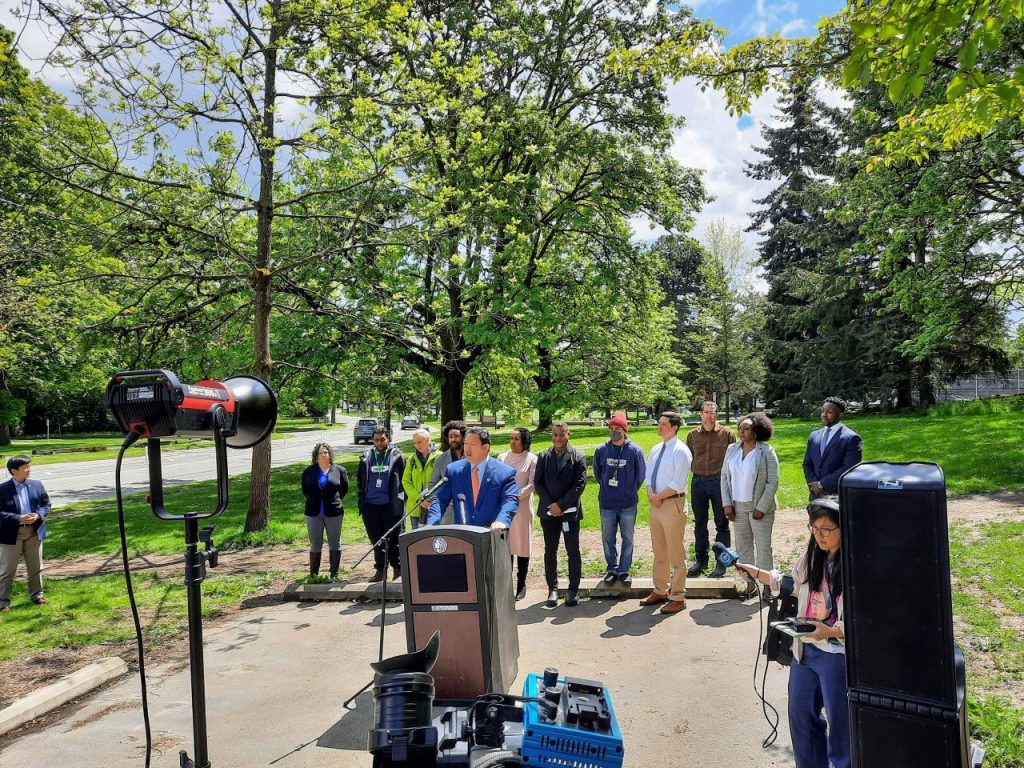
Charging into the Election Day finish line, Seattle Mayor Bruce Harrell has increasingly staked his reelection bid on negative attacks on challenger Katie Wilson. But the desperate attacks appear to be hurting Harrell’s favorability ratings, which are increasingly underwater, more than they’re hurting his opponent, who remains popular.
You’ve likely heard the caricatures drummed up by the campaign professionals working for Harrell and his surrogates: Wilson is an ill-prepared college dropout who took financial help from her parents to cover child care expenses. Her résumé is paper thin — albeit the same decade-old one Harrell supporters twice mailed across Seattle.
“For the entirety of this campaign, Katie Wilson has sold herself to voters as a working class person struggling to get by – but, at the eleventh hour, it took just one hard question from a journalist to reveal the truth: Katie Wilson has never had to struggle because her parents are still paying her bills at age 43,” said an unnamed spokesperson for the Harrell campaign in an press release dated October 23. “We cannot risk handing over the reins of the city to someone who has never managed an employee, doesn’t track her personal finances or those of her one-person non-profit, and who lives off their parents’ paychecks. Bruce knows what it means to work hard for opportunity. He and his family have lived the challenges that Katie Wilson claims to understand, but has yet to experience.”

Bruce Harrell’s net worth is listed $15 million at his most recent disclosure, including his $4 million 7,000-square foot mansion on Lake Washington. With wealth like that, affording child care was not a big concern for the mayor.
Blowback potential
In response, Wilson has noted her parents only began providing financial help after she launched her mayoral campaign, which increased her need for child care. Her campaign has highlighted affordability issues, including lowering the cost of child care and housing. Harrell’s barbs do risk only underscoring the fact that his opponent is more in touch on cost of living issues, living through them now.
An incumbent with a strong record to run on doesn’t lose a primary by nearly 10 points, like Harrell did. Without results to point to, tearing down your opponent becomes a much more enticing proposition. The Urbanist Elections Committee (on which I serve with 13 other members) endorsed Wilson, citing her coalition-building chops and inspiring vision for the city.
Going negative underscores that the “One Seattle” uniter that Harrell ran on in a vibes-y 2021 campaign that swept him into office was a farce — built on overpromising what he could deliver in office and the kind of mayor he would be. When pressed, the good guy vibes disappears, and the abrasive bully comes out.
Wilson has not returned the bully treatment, and has remained focused on policy disagreements, rather than personal ones.
This is despite ample opportunity to mine Harrell’s past for foibles, including his 1996 arrest for allegedly brandishing a gun during a dispute over a parking spot in a casino parking lot. Harrell also exhibited a pattern of defending abusers over the course of his career, from former Mayor Ed Murray to former police chief Adrian Diaz (who apparently oversaw rampant sexual harassment under his tenure) to his former external affairs director Pedro Gomez, who stands accused of rape.
Before he married and had three kids, Harrell fathered a child that he avoided acknowledging publicly and apparently rarely saw. This came up in Harrell’s first campaign for office in 2007, when the boy, Evan, went unmentioned on his campaign website. “It adds insult to injury for him to act like Evan doesn’t exist,” the boy’s mother Deborah Johnson told Seattle Weekly that year, adding that Harrell has been diligent in paying child support over the years, but has had minimal face-to-face contact with her son. She estimated they met three times between the ages of 7 and 15.
The turn of events turned out to be ample fodder for The Needling, a news satire site run by Lex Vaughn.
“After confirming to reporters that he would never use his more than $15 million net worth to help his adult children or grandchildren lest they immediately be like Wilson, Mayor Harrell and his campaign staff were seen brainstorming their next attack on his opponent from his waterfront, three-car garage glass house,” The Needling wrote.
Lashing out on homelessness
Another line of attack Harrell has recently pressed is the Wilson supposedly would let people who are homeless set up camp in parks, seeking to capitalize on her refusing to give a simple “yes or no” answer during a recent debate.
“Our parks define our quality of life. They are where families, kids, and neighbors without backyards can play, gather, and enjoy our city together,” Harrell said in a statement on October 30. “Unfortunately, with less than a week before this critical election, my opponent is signaling she’ll roll back progress by allowing tents to return to our parks and leaving people to suffer outdoors without shelter or services. We can’t go back to where we were in 2020 and 2021, we’ve got to keep moving forward.”
The conceit of Harrell’s claim is that he’s succeeded in clearing encampments from parks across Seattle. Anybody who has spends significant time in parks knows that’s not true. Many parks have seen sweeps, but the encampments form again, often dispersed into different areas or neighboring parks and green belts. In 2022, Harrell celebrated his team’s clearance of encampments at Woodland Park. However, since the City doesn’t have enough shelter and supportive housing, people who were swept (but not housed) did not simply disappear. Camps reconstitute and visitors to Woodland Park and other parks still encounter them on a routine basis.

Seattle’s shelter bed capacity actually shrank under Harrell’s watch and he fell well short of a campaign pledge to build 2,000 units of emergency housing in his first year. This helps explain why Harrell’s policy of aggressively ramping of encampment sweeps have been largely ineffective and often a quixotic quest. The encampments move, but the City and its partners have struggled to get people inside and connected to the services they need. The population of homeless people remains stubbornly high, well above many peer cities.
Ironically, another Harrell attack is that Wilson is proposing to allocate too many resources to sheltering people experiencing homelessness. Wilson has set a goal of 4,000 units of emergency housing and shelter in her first term. Wilson has even suggested converting vacant housing units at City-subsidized nonprofit buildings — a growing problem, particularly at higher rent bands — to serve low income tenants where the need is still high.
“Sustainable solutions to our housing and homelessness crises require stable leadership and meaningful action, not false promises and dangerous proposals that will set our city back,” Harrell said, apparently with no sense of irony after failing at his own 2021 campaign pledge.
Even his spotty record on homelessness has not stopped Harrell from declaring victory — especially when he’s speaking to more affluent crowds.
Speaking at the Woodland Park Zoo’s big “Jungle Party” high-dollar fundraiser on July 11, Harrell seemed to take credit for cleaning up the zoo, apparently referring to his campaign of encampment removals on Seattle Parks property next door at Woodland Park in the first year of his administration.
“When I took office about nearly four years ago, it was a disgrace what I was seeing out here — that it was almost desecrated in so many spaces in this entire campus,” Harrell said. “I want to thank all of you for helping me restore this zoo to some of its greatness, and we need to do. You are here because you care. You are here because you are passionate about conservation.”
How this related to a secured and gated zoo property where encampment had not really taken root is unclear. While the encampment sweeps were a plank of his 2021 campaign, the clearance were often a temporary condition. Woodland Park camps popped up again, with a similar story sweeped sites across the city. The City has sometimes achieved temporary relief, but the overall pattern is toward dispersing the problem rather than truly alleviating the issue and bringing people inside, as was a key part of the promise.
Harrell seemed to be off-script as he made remarks at the zoo’s biggest donors and staff. But it previewed a turn his campaign would soon make following its stumble in the primary — increasingly inhabiting their own warped version of reality. Harrell saved the zoo from homeless vagrants and the encampments never came back to Woodland Park. Who cares that it’s not true!
As the attacks fly, voters have a clear choice before them. A progressive challenger with a clear and hopeful vision for the future or an entrenched incumbent focused on lashing out at opponents and plodding along.
Doug Trumm is publisher of The Urbanist. An Urbanist writer since 2015, he dreams of pedestrian streets, bus lanes, and a mass-timber building spree to end our housing crisis. He graduated from the Evans School of Public Policy and Governance at the University of Washington in 2019. He lives in Seattle's Fremont neighborhood and loves to explore the city by foot and by bike.


